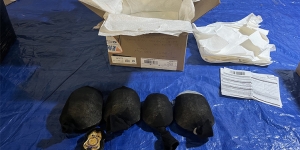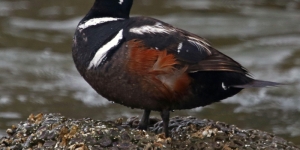Press Release
Auction House and Company’s President Plead Guilty to Wildlife Smuggling Conspiracy
For Immediate Release
Office of Public Affairs
Elite Estate Buyers Inc., doing business as Elite Decorative Arts, an auction house located in Boynton Beach, Florida, and the company’s president and owner, Christopher Hayes, pleaded guilty today in U.S. District Court in Miami to an illegal wildlife trafficking and smuggling conspiracy in which the auction house sold rhinoceros horns and objects made from rhino horn, elephant ivory and coral that were smuggled from the United States to China.
The guilty plea was announced today by Assistant Attorney General John C. Cruden for the Justice Department’s Environment and Natural Resources Division, U.S. Attorney Wifredo Ferrer for the Southern District of Florida and Director Dan Ashe of the U.S. Fish and Wildlife Service (FWS). The prosecution of Elite and Hayes is part of Operation Crash, a continuing effort by the Special Investigations Unit of the FWS’ Office of Law Enforcement in coordination with the Department of Justice to detect, deter and prosecute those engaged in the illegal killing of rhinoceros and the unlawful trafficking of rhinoceros horns.
According to records filed in court, Hayes and his company sold six endangered black rhino horns. Two of the horns were sold for $80,500 to a Texas resident involved in smuggling the horns to China. Two more rhino horns were purchased by an undercover FWS special agent. Another undercover agent with the FWS consigned two horns for auction.
As part of today’s plea agreement, Hayes and Elite have admitted to being part of a far reaching felony conspiracy in which the company helped smugglers traffic in endangered and protected species in interstate and foreign commerce, and falsified records and shipping documents related to the wildlife purchases in order to avoid the scrutiny of the FWS and U.S. Customs and Border Protection. Elite aided foreign buyers by directing them to third-party shipping stores that were willing to send the wildlife out of the country with false paperwork.
“In pleading guilty this auction house is admitting that it played a key role in the supply chain of rhino horn and elephant ivory to wildlife smugglers and foreign markets,” said Assistant Attorney General Cruden. “Auction houses and art galleries should be especially mindful of abiding by the laws designed to prevent the extinction of these species rather than devoting their expertise to help smugglers evade the law. This prosecution is the result of a sophisticated and long-ranging investigation into every aspect of the illegal wildlife trade and we will hold all law violators fully accountable for their actions.”
“Not only did Hayes and his company illegally profit from obtaining rhinoceros horns and elephant ivory, but his greed and indifference contributed to the senseless slaughter of these animals,” said U.S. Attorney Ferrer. “Trafficking in endangered and threatened species is illegal. Together with our law enforcement partners, we will strictly enforce the laws that protect our environment and our wildlife.”
“As this guilty plea demonstrates, ivory and rhino horn trafficking is not just a problem for other countries to solve,” said Director Ashe. “The ongoing slaughter of rhinos and elephants in Africa is driven by rising consumer demand and United States citizens like Christopher Hayes are intimately involved in illegal trade both here and abroad. We will continue to work with international law enforcement agencies and the international community to apprehend and bring to justice those whose callous disregard threatens the survival of the world’s wildlife heritage.”
Elite and Hayes also admitted to selling items made from rhinoceros horn, elephant ivory and coral to an antiques dealer in Canada, who they then directed to a local shipper that agreed to mail the items in Canada without required permits. The defendants also admitted to selling raw rhinoceros horns, which they believed were from a black rhinoceros, to a person in Texas.
Hayes, 55, of Wellington, Florida, will be sentenced by Judge Daniel T. K. Hurley on a date yet to be determined. The maximum penalty is five years in prison and a maximum fine of $500,000 for Elite and $250,000 for Hayes, or up to twice the gross gain. Elite has agreed to pay a $1.5 million fine and to no longer engage in the receipt, consignment or sale of endangered or protected wildlife, or items containing endangered or protected wildlife, including items containing rhinoceros horn, elephant ivory and red coral.
The investigation is continuing and is being handled by the FWS Office of Law Enforcement, the U.S. Attorney’s Office for the Southern District of Florida and the Environment and Natural Resources Division’s Environmental Crimes Section. The government is represented by Assistant U.S. Attorney Thomas Watts-FitzGerald for the Southern District of Florida and Trial Attorney Gary N. Donner of the Environmental Crimes Section.
Updated February 6, 2025
Topic
Wildlife

 U.S. Department
of Justice
U.S. Department
of Justice


